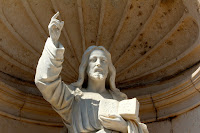Jesus repeatedly taught out the existence of the soul as separate from the body. He taught this within his teachings and activities.
Jesus also taught that the Supreme Being - is spiritual:
Here are but a few of the many statements Jesus made regarding our identity as spirit and not the physical body:
"And don’t fear those who can kill the body but are unable to kill the soul." (Matthew 10:28)"Watch out and pray that you will not be tempted – for the spirit may be willing but the physical body is weak." (Matt. 26:41 and Mark 14:38)“For this reason I say to you, don’t be anxious about your life, as to what you will eat or what you will drink; nor for your body and what you will wear. Is not the soul more than food, and the body more than clothing?" (Matt. 6:25)"For this reason I tell you, don’t worry about yourself – or about your body: What you will eat or what you will wear. Because the soul is greater than food just as the body is greater than clothing." (Luke 12:22-23)"It is spirit that gives life; the physical body provides no benefit." (John 6:63)"That which arises from the flesh is flesh, and that which arises from the Spirit is spirit." (John 3:6)Jesus said, “One realizes the material world through the physical body.
But for one who occupies the physical body, the material world is not satisfying.” (Gospel of Thomas 80:1-2)
"But when you see your true self that existed before your body, which never dies nor becomes visible, how can you rely on it?” (Gospel of Thomas 84:2)
“Wretched is the body that depends upon a body.
And wretched is the soul that depends upon them both.” (Gospel of Thomas 87:1-2)
Jesus is also identified as spirit - and not his physical body:Jesus' students also taught that we are not the physical body:
As the body without the spirit is dead, so faith without deeds is dead. (James 2:26)
He allowed his body to die, while eternal life clothes him. Having disrobed himself of perishable rags, he dressed in immortality, which no one can possibly remove. (Gospel of Truth 17)
This is the nature of the soul – something valuable has been placed within a shameful body. (Gospel of Philip 23)
The Master rose from the dead body. He became like himself, but his body became entirely perfect. He has a body but this body is indeed the true body. Our body is not true, but is rather a reflection of the true body. (Gospel of Philip 78)
Jesus called out with a loud voice, “Father, into your hands I commit my spirit.” When he had said this, he breathed his last. (Luke 23:46)Jesus' followers also understood that Jesus left his physical body at the time of death:
And when Jesus had cried out again in a loud voice, he gave up his spirit. (Matt. 27:41)
When he had received the drink, Jesus said, “It is finished.” With that, he bowed his head and gave up his spirit. (John 19:30)Thus the scriptures clearly identify that Jesus' physical body died as his spirit - himself - left the physical body. This is precisely what clinical death research has revealed, and what simple observation reveals - that the physical body becomes lifeless at the time of death because the spirit-person has left the body.
Jesus also taught that the Supreme Being - is spiritual:
"God is spirit, and His worshipers must worship in the Spirit and in truth." (John 4:24)
